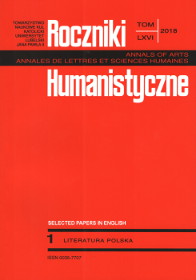Some Remarks on the Methodological Compulsions in the Studies on Old-Polish Literature
Abstract
The Polish version of the article was published in “Roczniki Humanistyczne,” vol. 56 (2008), issue 1.
The paper is a hidden polemic with the texts that have recently been published (not quoted by their names or indicated in the footnotes). These texts have brought forth a diagnosis that there is a delay in terms of methodology with regard to the studies on Old-Polish literature and have postulated their application to the studies on ancient literature. The author formulates her belief that traditional philology is indispensable in the studies on Old-Polish literature with an awareness that there should be a free choice in selecting the method of its interpretation. The text emerges from a protest against the rhetoric of methodological directives formulated under the influence of fashion, ideology, or fatigue with the object of research and from radical distrust to methodological directives as such, and the majority of directives in general.
References
Domański, Juliusz. “Recepcja—imitacja—emulacja. Kilka uwag o twórczości łacińskiej humanistów jako wyrazie postawy użytkowniczej wobec dziedzictwa antycznego” [Reception—imitation—emulation. A few comments on texts by Latin humanists as a token of their utilitarian approach to the legacy of the Antiquity]. Odrodzenie i Reformacja w Polsce 47 (2003): 7–19.
Domański, Juliusz. Użytkownicy i badacze dziedzictwa antycznego, czyli o różnicy między humanizmem a humanistyką [Users and researchers of the legacy of the Antiquity, or on the difference between humanism and the humanities]. Lublin: Towarzystwo Naukowe KUL, 2007.
Hanusiewicz, Mirosława. Pięć stopni miłości. O wyobraźni erotycznej w polskiej poezji barokowej [Five stages of love. On the erotic imagination in Polish Baroque poetry]. Warszawa: Wydawnictwo Naukowe Semper, 2004.
Hanusiewicz, Mirosława. Świat podzielony. O poezji Sebastiana Grabowieckiego [A divided world. On the poetry of Sebastian Grabowiecki]. Rzym–Lublin: Fundacja Jana Pawła II–Redakcja Wydawnictw KUL, 1994.
Karpiński, Adam. „O konsekwencjach ‘wieku rękopisów’. Rekonstruowanie epoki,” [On the consequences of the “age of manuscripts”. Reconstructing an era]. Teksty Drugie issue 3 (1994): 5–21.
Kochanowski, Jan. List do Stanisława Fogelwedera [A letter to Stanisław Fogelweder]. In idem. Dzieła polskie [Polish works]. Edited by Julian Krzyżanowski, 749–752. Warszawa: Świat Książki, 1980.
Kochanowski, Jan. Odprawa posłów greckich [The Dismissal of the Greek Envoys]. Edited by Tadeusz Ulewicz. Wrocław: Zakład Narodowy im. Ossolińskich, 1962.
Kochowski, Wespazjan, “Trybut należyty wdzięczności […] albo Psalmodia polska za dobrodziejstwa Boskie dziękująca [...]” [the due tribute of gratefulness (…) or Polish psalmody of thanksgiving for God’s bounty (…)]. In idem. Utwory poetyckie [Poetic works]. Selection and edited by Maria Eustachiewicz, 367–456. Wrocław: Zakład Narodowy im. Ossolińskich, 1991.
Korczyński, Adam. Wizerunek złocistej przyjaźnią zdrady [An image of treachery with a silver lining of friendship]. Edited by Radosław Grześkowiak. Warszawa: Instytut Badań Literackich PAN, 2000.
Mandel’shtam, Osip. “About the Nature of Word.” In idem. Selected Essays. Translated by Sidney Monas. University of Texas Press, 1977.
Niemcewicz, Julian Ursyn. Powrót posła. Komedia w trzech aktach oraz wybór bajek politycznych [A return of an envoy. A comedy in three acts and a selection of political fables]. Edited by Zdzisław Skwarczyński. Wrocław: Zakład Narodowy im. Ossolińskich, 1983.
Nowicka-Jeżowa, Alina. “Komparatystyka i filologia. Uwagi o studiach porównawczych literatury epok dawnych” [Comparative studies and philology. Comments on the comparative studies of old literatures]. In Polonistyka w przebudowie. Literaturoznawstwo—wiedza o języku—wiedza o kulturze—edukacja. Zjazd polonistów, Kraków 22–25 września 2004 [Polish Studies under reconstruction. Literary Studies—Linguistics—Cultural Studies—Education. A congress of Polish Studies scholars, Krakow 22–25 September 2004], vol. II, 348–361. Edited by Małgorzata Czermińska et al. Kraków: Universitas, 2005.
Nowicka-Jeżowa, Alina. Pieśni czasu śmierci. Studium z historii duchowości XVI–XVIII wieku [Songs of the time of death. A study in the history of spirituality in the 16th-18th centuries]. Lublin: Towarzystwo Naukowe KUL, 1992.
Nycz, Ryszard. “Słowo wstepne,” [Introduction]. In Dekonstrukcja w badaniach literackich [Deconstruction in literary studies]. Edited by Ryszard Nycz, 5–14. Gdańsk: Słowo / obraz terytoria, 2000.
Orzeszkowa, Eliza. Marta [Martha]. In eadem. Pisma zebrine [Collected works]. Edited by Julian Krzyżanowski, vol. 36. Warszawa: Książka i Wiedza, 1951.
Sławiński, Janusz. “Zwłoki metodologiczne” [Methodological delays]. In idem. Teksty i teksty [Texts and texts], 45–53. Warszawa: Universitas, 2000.
Twardowski, Kasper. Lekcyje Kupidynowe [Cupid’s lessons]. Edited by Radosław Grześkowiak. Warszawa: Instytut Badań Literackich, 1997.
Wojtkowska-Maksymik, Marta. ‘Gentiluomo cortigiano’ and ‘Dworzanin polski’. Dyskusja o doskonałości człowieka w ‘Il Libro del Cortigiano’ Baldassarra Castiglionego i w ‘Dworzaninie polskim’ Łukasza Górnickiego [“Gentiluomo cortigiano and Dworzanin polski. A debate on the perfection of man in Il Libro del Cortigiano by Baldassarre Castiglione and in Dworzanin polski by Łukasz Górnicki]. Warszawa: Instytut Badań Literackich, 2007.
Ziemba, Kwiryna. Jan Kochanowski jako poeta egzystencji. Prolegomena do interpretacji „Trenów” [Jan Kochanowski as a poet of existence. Introductory remarks for the interpretation of The Threnodies]. Warszawa: Towarzystwo Ogród Ksiąg, 1994.
Ziemba, Kwiryna. “Literatury Rzeczypospolitej Obojga Narodów ze stanowiska komparatystyki wewnętrznej” [The literatures of Both Nations from the position of internal comparative studies]. In Barok polski wobec Europy. Sztuka przekładu, materiały międzynarodowej konferencji naukowej w Warszawie 15–17 września 2003 roku [Polish Baroque vs. Europe. The art of translation, proceedings from an international conference in Warsaw, 15–17 September 2003]. Edited by Alina Nowicka-Jeżowa, Marek Prejs, 393–407. Warszawa: ANTA, 2005.
Copyright (c) 2018 Roczniki Humanistyczne

This work is licensed under a Creative Commons Attribution-NonCommercial-NoDerivatives 4.0 International License.





